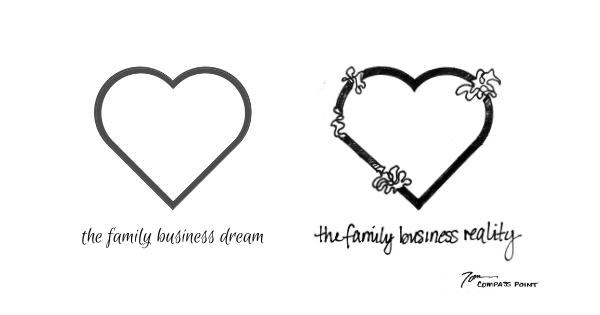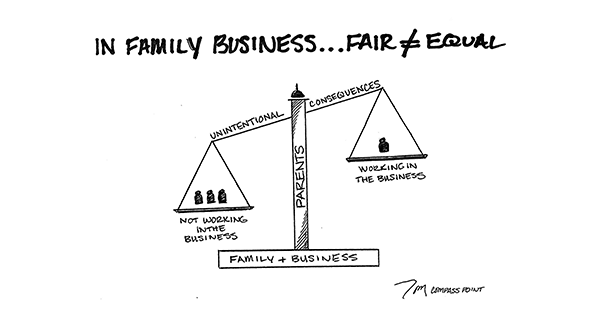TRANSITION / SUCCESSION
Bridging Generations: Governance and Communication Ensures Long-Term Family Business Success

Working in a family can be a rollercoaster experience. It’s rewarding, exciting, and filled with purpose – but it can also get complicated, emotional, and stressful.
Did you know that Family Businesses are:
- Nearly 90% of all businesses in the U.S.
- Contributing to 64% of the national GDP
- Employing 62% of the workforce
- Accounting for 78% of all new job creation
They’re truly the backbone of our economy. But with all that success comes a unique set of challenges.
As business owners and family members, it can be tough to take a step back and work on the business, instead of just working in the business. The list of thing-to-do is endless, and the day-to-day can easily take over. But taking the time to focus on long-term growth, strategic planning, and the bigger vision for the company is crucial. If we don’t carve out that space, it can be hard to keep the business moving in the right direction.
Why Does Governance Matter in a Family Business?
Family businesses bring together personal and professional dynamics that can make navigating business decisions tricky. Believe me when I say – it’s much easier when you have the tough conversations upfront, rather than ignoring the elephant in the room. Without clear boundaries and clear lines between family and business, things can and will get messy. And when conflicts arise, it’s not just the business that’s affected. Your relationships with the people you share holidays and weekend dinners with can also be on the line.
This is why establishing proper governance in a family business is essential. Without it, the lines between family and business can blur, causing confusion, resentment, and ultimately dysfunction. Clear governance helps prevent those problems from taking root and keeps everything running smoothly.
A key part of family governance is defining roles and responsibilities early on. When family members are involved in the business, it’s important to establish clear roles so that everyone knows where they stand. This reduces confusion and ensures that decisions are made without family being the primary consideration. It sounds simple, but take a moment to think about it…Do the family members in your business have clearly identified roles and responsibilities?
Communication Across Generations
One of the greatest strengths – and sometimes the greatest challenges – of family businesses is the involvement of multiple generations. The different perspectives, values, and priorities of older and younger generations can lead to disagreements. But that’s where effective communication comes in.
Setting up a family governance structure creates a formalized space for open, honest, and transparent communication. Family councils, for example, provide a platform for different generations to share their thoughts, ideas, and concerns about the business’s future. Including younger family members in these conversations ensures they have a voice in shaping the direction of the company. Older generations can pass down their wisdom and experience, while younger generations bring fresh ideas and innovative perspectives. Another essential tool is a family constitution. This document outlines the values, principles, and rules that govern both the family and the business. It provides clarity on everything from ownership and succession planning to decision-making processes, helping guide tough decisions when they arise.
Take, for example, when cousin Ryan, with no prior experience, declares at Thanksgiving dinner that he wants to join the family business. A family constitution can help prevent awkward moments like this by specifying who can work in the business and under what conditions. It can set clear expectations regarding education, experience, compensation (whether based on market rate or family rate), and the need to gain experience in other roles – such as working outside the family business – before being considered for a position. This clarity helps prevent misunderstandings and potential hurt feelings, ensuring that everyone understands the process and expectations.
Communicating across generations in family business is crucial. Family businesses thrive when multiple generations are involved – but let’s be real, it can also get complicated. Different values, priorities, and communication styles can lead to misunderstandings. That’s why having a solid communication framework is key.
How to Make It Work:
Create a Family Governance Structure
- Establish a family council to encourage open, honest, and transparent discussions
- Give younger family members a voice in shaping the company’s future
- Allow older generations to share wisdom while welcoming fresh ideas from younger members
- Develop a Family Constitution
- Outline values, principles, and decision-making rules
- Clarify key aspects like ownership, succession planning, and leadership roles
- Serve as a guide for tough business decisions
Set Clear Expectations for Family Employment
- Define who can work in the business and under what conditions
- Specify education, experience, and outside work requirements before joining
- Ensure compensation aligns with market rates or family agreements
- Example: Avoid the awkward Thanksgiving moment when cousin Joe – who’s never worked a day in the business – announces he wants in. A well-structured family constitution keeps things fair and drama-free.
- By putting these structures in place, families can strengthen their business and relationships for the long haul.
The Benefits of Strong Governance
When family businesses establish strong governance structures, we see the business thrive both personally and professionally. Some of the major benefits include:
- Conflict Prevention and Resolution
Family businesses are often more prone to conflicts – whether over money, leadership transitions, or business strategy. A solid governance system helps to prevent these conflicts from arising and provides a clear framework for resolving issues when they do occur. - Succession Planning
One of the toughest challenges in family businesses is planning for succession. Governance structures ensure that leadership transitions and ownership changes happen smoothly, protecting the business from disruptions that could otherwise threaten its survival. - Alignment of Business and Family Goals
A family council or constitution helps keep the family aligned with the business’s goals. This alignment creates trust, cooperation, and a shared commitment to the company’s success. - Professionalization of the Business
A formal governance structure adds a level of professionalism to the business, which can help it navigate challenges and scale more effectively. It also signals to potential investors and partners that the business is stable and well-managed. - Generational Legacy
Strong governance also helps ensure the long-term preservation of the family’s legacy. By establishing clear frameworks for future generations, the family business has a better chance of surviving and thriving in the years to come.
Family businesses are built on trust, shared values, hard work, and open communication. The insights shared in this blog can help families navigate the complexities of working together and set your business up for long-term success.
When you create these structures, you’re not just investing in the health of the business – but also in the legacy that your family has worked so hard to create. So, let’s keep those conversations going, build a solid foundation, and set your business up for success – now and in the generations to come.
You may also like…

BLOG | FAMILY DYNAMICS / GOVERNANCE
A Strong Family Business Isn’t Perfect
Running a family business is a lot like any other business. There are sales goals to meet, market trends to monitor, supply chains to navigate, stakeholders’ expectations to manage and people to hire, fire and develop. Pretty much the same… UNTIL you add FAMILY. And then, there are family dynamics to consider as you chart your business's course and build a strong family business.
Read More
BLOG | FAMILY DYNAMICS / GOVERNANCE
Distress on the highway of life & business
While the internal impact of distress is both financial and emotional, the...
Read More
BLOG | FAMILY DYNAMICS / GOVERNANCE
Fair does not ‘equal’ equal
This is one of the biggest problems in family business governance, where parents...
Read MoreWhere Family Businesses Come to Grow & Learn
At Compass Point, we make it easy to get insights, training, tools, and articles straight to your inbox and help family business owners and their team continue to grow, learn, and lead.


